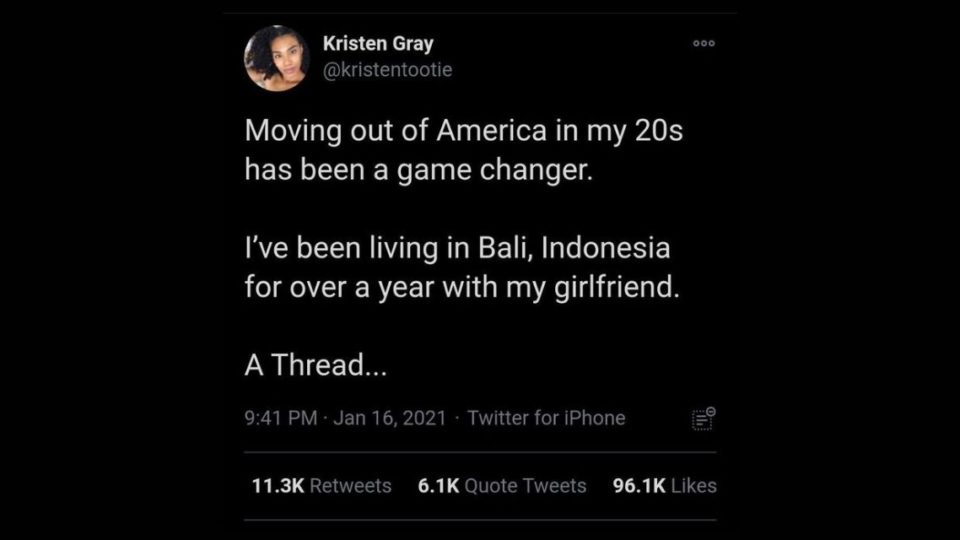What happens when you carelessly label a place as queer-friendly without considering the bigger picture? In the case of an American digital nomad named Kristen Gray, highlighting Bali as such turned into one of the justifications for homophobic officials to deport her from Indonesia.
Now, there’s a growing fear among LGBT Indonesians that the turn of events may have deep repercussions for an already persecuted minority group in the country.
The tweets and the fallout
If you’ve been following the controversy, then chances are you’ve heard that Gray has been deported from Indonesia. She will not be allowed back into the country for six months.
The fallout came after her Jan. 16 tweets went viral on Twitter, where she detailed her new life in Bali after moving here about a year ago and then encouraging others to do the same. The thread soon turned into a huge controversy, with many Indonesians accusing her of abusing her privilege as a foreigner, being culturally tone-deaf, and possibly committing visa violations.
Gray’s tweets were problematic for many reasons, as the conditions she gushes about highlighted multilayered problems in Indonesia, such as over-tourism and immigration. The reasons for her eventual deportation are also multifold, as officials deemed that she has violated a number of regulations, including the purpose of her stay permit, and “spreading information that could unsettle the public.”
The unsettling information, officials say, include her suggestion that Bali is queer-friendly, which Gray had listed on Twitter as one of the benefits of living on the island.
“I am not guilty. I have not overstayed my visa. I have not made money in Indonesian rupiah in Indonesia. I put out a statement about LGBT, and I’m being deported because of LGBT,” Gray said to local reporters yesterday.
Gray’s statement to the press and the government’s decision to use the queer-friendly part of her viral tweets as a reason to deport her are now creating unease among many Indonesians, who are bracing for potentially negative consequences for the country’s LGBT community. Some took to Twitter to express their frustration:
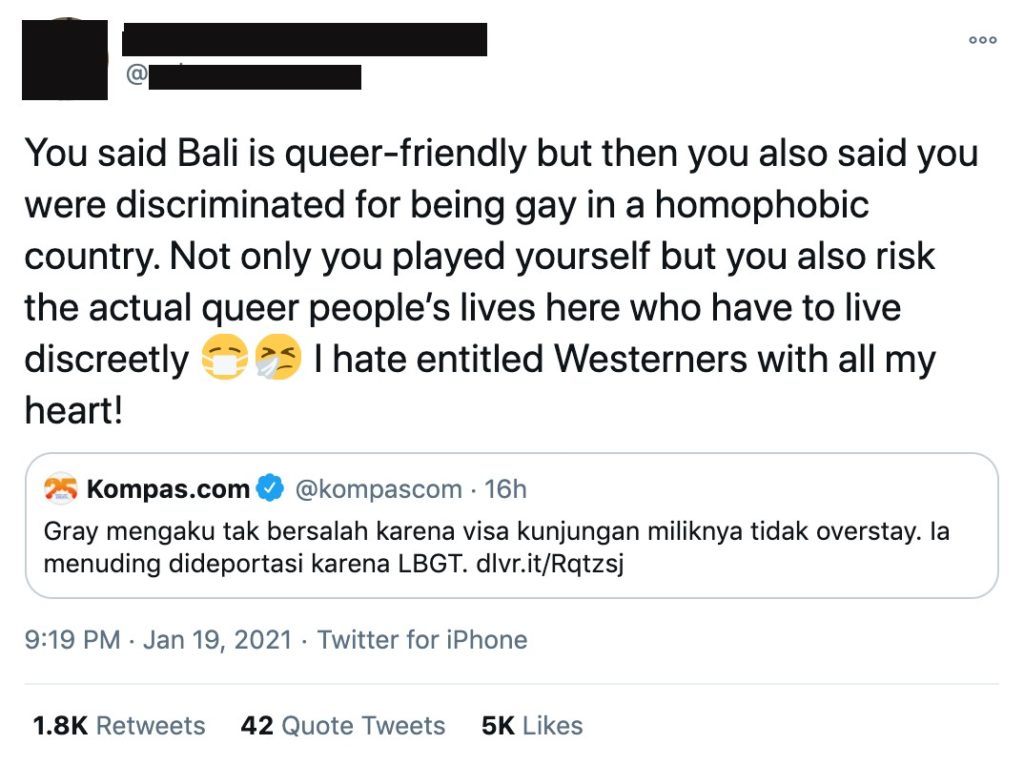
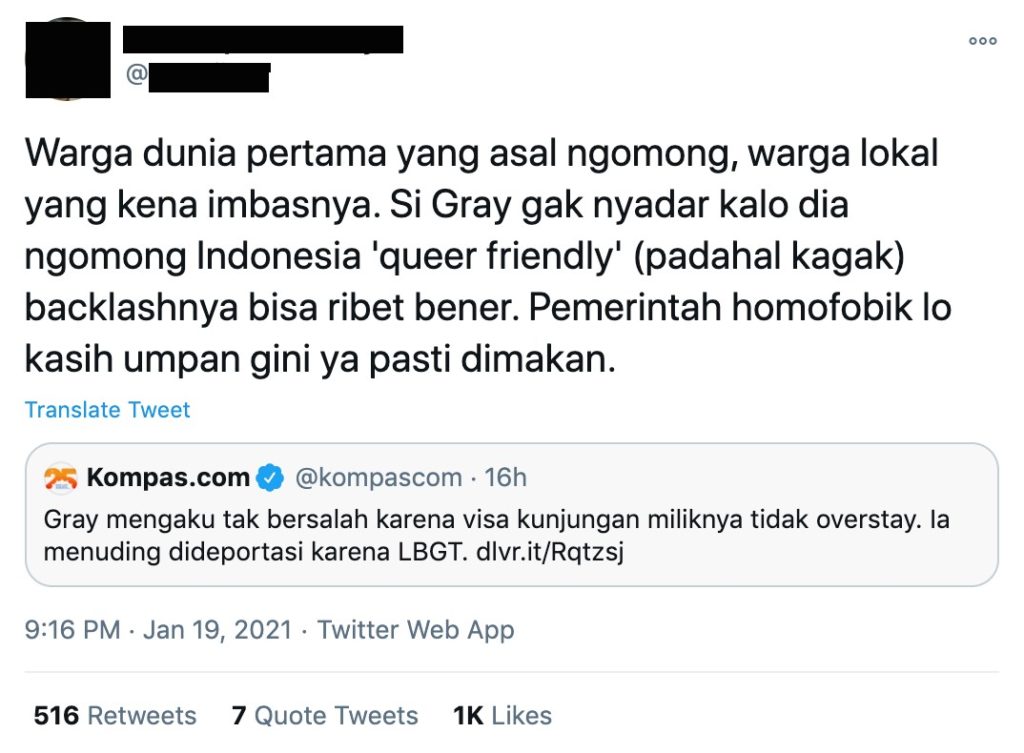
“A first world citizen talking without thinking, local residents bearing the brunt. Gray didn’t realize that saying Indonesia is queer-friendly (when it isn’t) will result in a complex backlash. You give bait like this to a homophobic government, of course it will get eaten.”
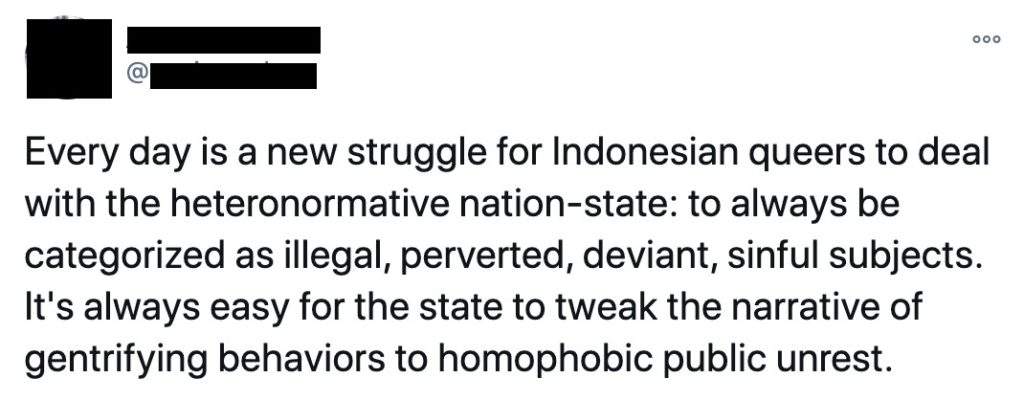
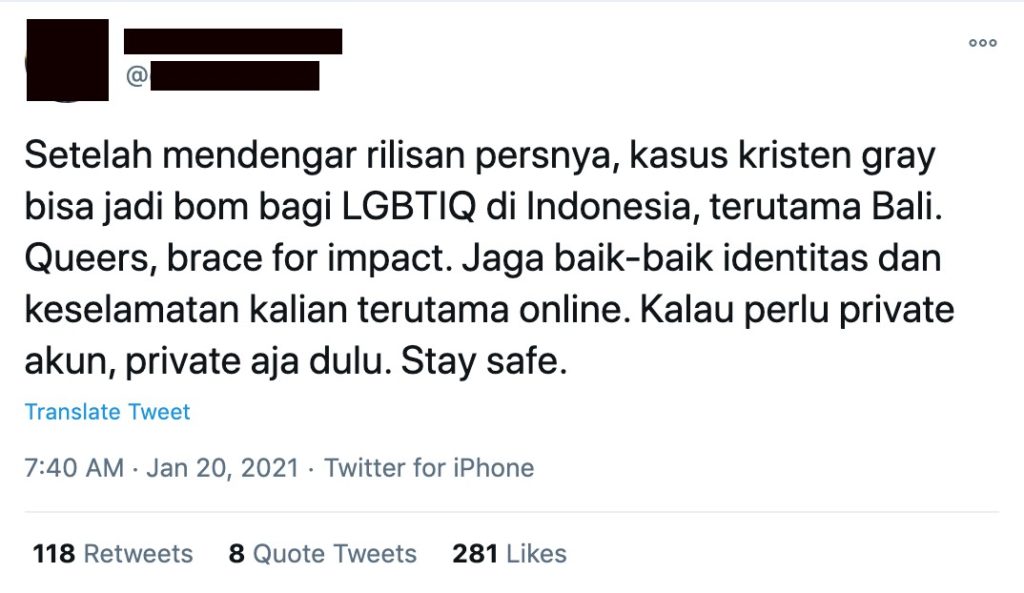
“After listening to the press [conference] the case of Kristen Gray can turn into a bomb for LGBTIQ in Indonesia, especially in Bali. Queers, brace for impact. Take care of your identities and safety, especially online. If you need to private your account, go private. Stay safe.”
We have attempted to reach Gray for her comments, but her social media accounts appear to have either been deleted or set to private following the online backlash.
Officially sanctioned persecution
Last January, authorities in Bali inspected accommodations for allegedly catering exclusively to the gay community. Another instance of anti-LGBT sentiment took place in August, when police raided a “gay party” in Kuningan, South Jakarta in August, which was one of the more recent intervention of LGBT gatherings performed by authorities in Indonesia.
While homosexuality is technically legal in Indonesia (with the exception of conservative Aceh with its strict Islamic laws), there has been a disturbing rise in persecution against LGBT individuals in recent years, which international NGO Human Rights Watch labeled as an “anti-LGBT moral panic” in 2018.
Social psychologist Benny Siauw warned that Gray’s statement mentioning Bali as a queer-friendly place might have a negative ripple effect for Indonesian queers, especially now that it is used by officials as one of the reasons to deport her.
He cited a survey conducted by US-based Pew Research Center published last year, which found that only around 9 percent of Indonesians say homosexuality should be accepted.
“So, where should Indonesian queers go to if this leads to future homophobic persecutions?” Benny said.
While Bali is indeed recognized for being more tolerant than the rest of Indonesia, the province is far from fully accepting queerness, according to singer-songwriter Kai Mata, who’s one of the few Indonesians who have dared to go public about their sexuality in the country.
“I wish these statements of Bali being queer-friendly was reality … Indonesian culture at large heavily shames those who are LGBTQ+, equating our love to a mental illness that needs to be cured or prayed away,” Kai said.
“Bali seems to just barely tolerate queer foreigners and Indonesians, as if it’s a generous gift to allow us existence, so long as we do so quietly and in the shadows.”
Kai, who lives in Bali and has faced death threats for being openly queer in Indonesia, explains that Gray may have benefited from the limited circle she spent time with in the one year she was here.
“I do worry this case with Gray is building a stronger presence of anti-LGBTQ+ sentiment in Bali and Indonesia,” Kai said.
What may have been intended as an inspiring guide has turned into a convoluted story that is also worthy of the ensuing debate. However, Gray’s is also a story of one arguably privileged foreigner who recklessly glamorized what living in Bali is like, possibly at the expense of safety and future of queer Indonesians.
